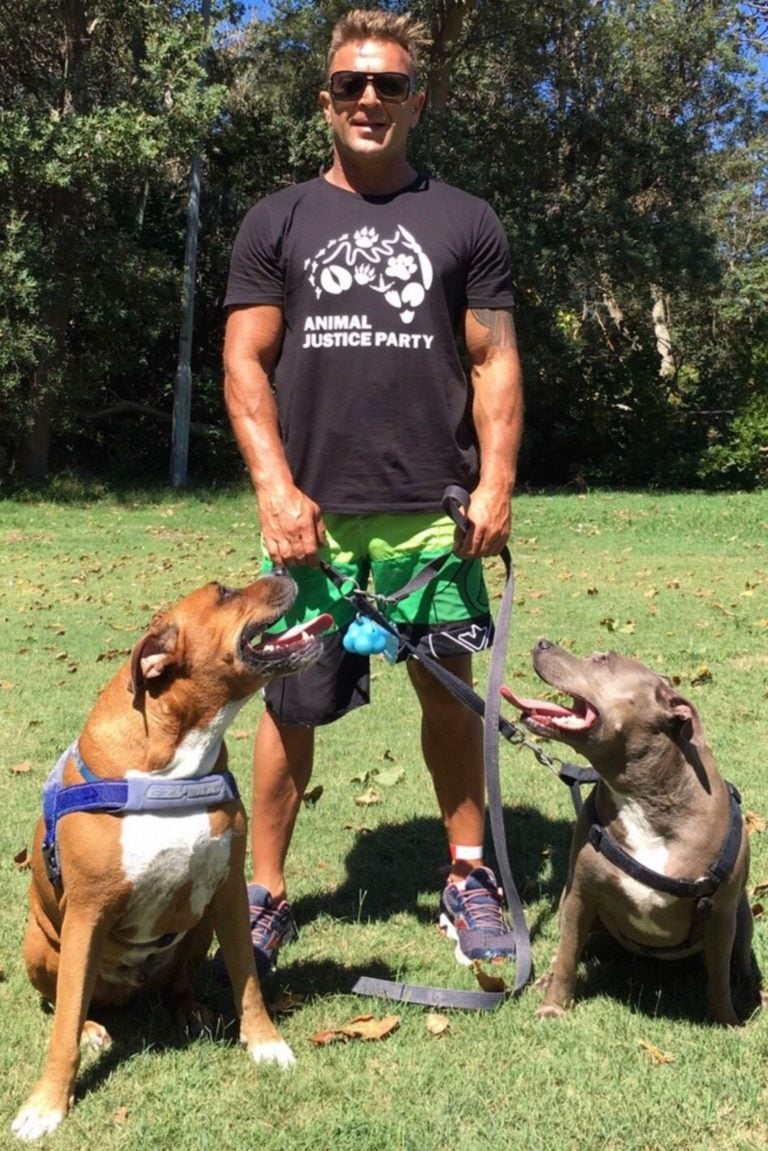More and more Greek Australians are choosing a cruelty-free lifestyle, abstaining not only from eating meat but all animal products. Paul Collaros has taken his ideology one step further by advocating for animal rights in the political arena.
I am the founder of the Penny Marathon [pennymarathon.com], an animal welfare charity that raises awareness of the plight of suffering animals by hosting an annual marathon in cities around the world.
For me, my awareness started early, when, at the age of about eight or nine, I decided to stop eating meat. My family accommodated the decision, and now, at the age of 45, I have been a vegan for many years.
I met Paul Collaros as a participant of the Penny Marathon in Sydney in 2018. It is not every day you meet a Greek-Australian vegan, particularly a man who has made that choice. “I realise I don’t fit the stereotype,” he says, “but it’s a changing world, and veganism will one day become the new normal.”
Footballer Chris Mayne, NBA basketballer Kyrie Irving, martial artist Nate Diaz, triathlete Rich Roll, even Patrik Baboumian, Germany’s strongest man – all plant-based athletes. And that’s just the men. You’ve got Olympian sprinter Morgan Mitchell, surfer Tia Blanco, professional ballerina Juliet Burnet… too many to list; all female vegans at their physical best, advocating for cruelty-free lifestyles .
Paul is running for the Animal Justice Party in Sydney’s Rockdale electorate in the forthcoming NSW state elections of 23 March. In 2015, the party secured a seat in the NSW Parliament for the first time in history, and is expecting to rattle the cages further. This year, more than 60 AJP candidates are running; not bad for a party that was formed only 10 years ago.
“We’ve got to face facts. Regardless of what you think about animal rights, this unhealthy planet of ours can no longer — just from an environmental perspective — sustain the practice of animal production as a food source,” says Paul.
“Water resource, for example; a lot of water is required for meat and dairy production. The global average water footprint of beef is over 15,000 litres per kilogram. That means it takes huge volumes of water to grow a cow, pig, and so forth, for slaughter. For a country constantly threatened by drought – it makes no sense but to look for smarter ways of keeping us fed.”
Step into Coles and Woolworths supermarkets these days and you will find vegan alternatives for almost any food you can think of. Vegan sausages, cheese, ice cream, yoghurt, mayonnaise… my local supermarket carries eight varieties of soy, almond and rice milk these days.
It is one of the fastest growing food sectors globally. The value of packaged vegan food in Australia alone is forecast to exceed $200 million in 2020; almost double what it was four years ago.

In conversations with people, it’s not the practical issues that people fixate on; it’s the ethical. People are often ready to challenge a vegan but not willing to hear their response.
“It’s about compassion and I challenge anyone to take a look at footage of an animal dying from the use of the government-endorsed poison 1080 or dying a slow and painful death on a ship being exported out of Australia, and not be affected,” Paul adds.
Abstaining from eating meat is not a fad. It is not a new phenomenon. And it’s not new to Greeks, either. Pythagoras famously wrote that as long as man continues to massacre animals he is unable to reap joy and love. The exchange below is a translation from the 5th century BC in Plato’s The Republic:
Socrates: Would this habit of eating animals not require that we slaughter animals that we knew as individuals, and in whose eyes we could gaze and see ourselves reflected, only a few hours before our meal?
Glaucon: This habit would require that of us.
Socrates: Wouldn’t this [knowledge] hinder us in achieving happiness?
Glaucon: It could so hinder us in our quest for happiness.
Socrates: And, if we pursue this way of living, will we not have need to visit the doctor more often?
Glaucon: We would have such need.
Socrates: If we pursue our habit of eating animals, and if our neighbour follows a similar path, will we not have need to go to war against our neighbour to secure greater pasturage, because ours will not be enough to sustain us, and our neighbour will have a similar need to wage war on us for the same reason?
Glaucon: We would be so compelled.
Socrates: Would not these facts prevent us from achieving happiness, and therefore the conditions necessary to the building of a just society, if we pursue a desire to eat animals?
Glaucon: Yes, they would so prevent us.
More information on the Animal Justice Party is available at animaljusticeparty.org. To learn more about living a cruelty-free life visit Animals Australia at animalsaustralia.org. The Penny Marathon will take place on Sunday, 21 July.









